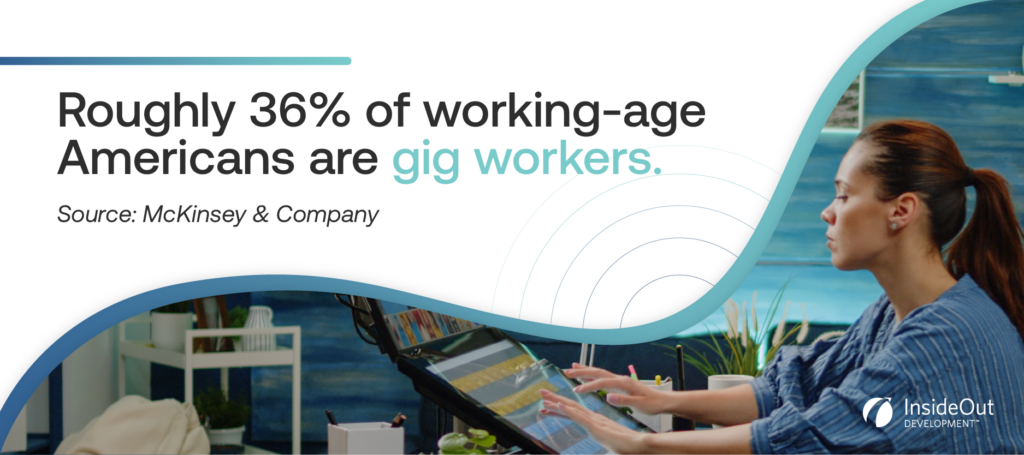The gig economy that arose in the wake of the 2008 real estate crash is alive and well more than 10 years later. Most people know about driving for Uber or Lyft, delivering restaurant orders for DoorDash, and selling handmade items on Etsy. Freelance writers abound.
But the gig economy is much wider and more diverse than driving, freelance writing, and selling handmade goods. People are gigging as social media managers, writers and editors, photographers, and consultants because of new technologies that make it easier than ever to reach consumers directly and economically.
What Is the Gig Economy?

The gig economy refers to a labor market characterized by short-term, flexible, and freelance work arrangements, often facilitated by digital platforms or apps. In the gig economy, individuals take on temporary or project-based tasks for various clients or companies.
A gig economy worker typically enjoys autonomy in choosing when, where, and how much they work, providing flexibility but often lacking the job security and benefits associated with traditional employment.
Gig Economy Growth
The gig economy has expanded significantly in recent years, driven by technological advancements and changing attitudes toward work, giving rise to a diverse range of opportunities and challenges in the modern workforce.
In 2022, McKinsey & Company reported that approximately 36% of working-age people in the United States are independent or gig workers. On the other hand, this figure was 27% in 2016.
Gigging by Choice, Chance, or Necessity
There’s not just one kind of gig worker in today’s work world. They work gigs full-time, part-time, or on the side with traditional jobs. It’s an avenue for extra income and independence, and gig workers are happier if it’s their choice.
Many professionals choose freelance, remote, or contract work to pursue passions and escape the 9-to-5. The dark side of the gig economy is that many gig workers can’t find jobs or better pay and are gigging because they don’t have a lot of other options.
Additionally, there aren’t a lot of protections for these individuals, and working independently leaves freelancers vulnerable to financial loss from clients, taxes, and benefits like health insurance and employer-sponsored retirement plans.
Even side gigs like earning some extra income in spare time driving for Uber mean that gig workers have to learn about paying taxes on self-employment income, making sure they have the proper insurance coverage for driving for pay, and providing for their personal safety when dealing with customers contacted virtually.
Other gig work requires contracts, which creates a whole new learning curve for someone who is used to working for an employer in a traditional employment relationship.
If your company is using gig workers, or a “1099” workforce for intermittent, seasonal, or special project work, you may want to consider coaching gig workers in some of these pain-point areas for support and motivation.
4 Tips for Coaching Gig Workers in and Out of the Office

The principles and benefits of coaching — such as performer-led accountability, increased problem-solving, high employee engagement, and productivity — are very apparent for gig workers.
With the growing size of the gig economy in today’s workplace, the contrast between traditional employees and independent contractors may create challenges for employers. If your gig workers don’t come into the office every day but work remotely, they still have coaching needs, and you’ll likely have more challenging coaching issues.
1. Improve Remote Communication
One very important coaching issue with remote workers is communication. Without face-to-face communication, you have to take more care that remote communications like email, text, voicemail, and phone calls are timely, clear, and appropriate to the tasks that need to be accomplished.
When you need to share important information quickly, phone calls are better than a long, rambling email or text. Texts should be restricted to short bursts of information that need to get to the recipient fast. Video and email are best for information that needs to be retained but is more lengthy than a simple exchange.
2. Make Gig Workers Feel Welcome
Another important aspect of coaching for freelancers, remote workers, and gig workers is making them feel welcome and included in your company culture.
Motivating and engaging traditional employees alongside independent contractors with more freedom, flexibility, and possibly opportunity can make welcoming and including them in the company overall difficult.
Additionally, department or team meetings, performance reviews, and company norms such as dress codes can make it hard to create a uniform, overall culture that includes everyone and encourages successful teamwork.
Whether your company allows workers to work from home a few days a week or has a significant remote workforce, it’s important to build teamwork and culture into their experience.
The Society for Human Resource Management (SHRM) recommends onboarding gig workers with welcome communications, a culture mentor or guide, and an organized, work-ready workspace. The Forbes Human Resources Council also encourages leaders and managers to:
- Provide things like technology for virtual coworking so remote workers can work together and avoid isolation
- Host connected social events and meetings
- Actively mentor and coach remote employees
Leveraging software for collaboration in the gig economy helps create a productive and enjoyable work experience for non-traditional and traditional employees alike.
3. Know the Differences Between Traditional and Gig Economy Workers
While remote workers still need structure and guidance, they require a different approach when it comes to performance reviews, discipline, and management, according to Dana Wilkie, writing for SHRM.
Wilkie talked to professionals like Michael Pilnick, Executive Vice President of Global HR at First Advantage Bank, about the challenges of creating positive, productive work experiences for remote workers.
Pilnick says remote workers require less managerial guidance than traditional employees and aren’t really subject to regular discipline because of the contractual nature of their work.
Marc Solow of HR shared services at Deloitte says that coaching gig workers is usually centered on the task or project for the duration of the contract, rather than overall employee development or succession grooming.
Because of that, PeopleScience Editor-in-Chief Jeff Kreisler suggests providing remote workers with as much autonomy as possible, encouraging networking with other remote workers both inside and outside of the organization to support their interests and engagement.
4. Understand that Coaching in the Gig Economy Is a Fine Line
While there are many different reasons for people and employers to participate in gig economy work, it’s especially important for employers to stay aware of the status of contract workers.
Independent contractor status means employers must demonstrate that they do not control and direct the performance of work, nor dictate the ways independent contractors accomplish the work they are contracted to do. Treating gig workers the same as traditional employees may trigger employer responsibilities to provide benefits and assume employment tax liabilities.
At the same time, employers must remember that contract workers represent their companies to clients and the public and make their work experience as enjoyable and beneficial as possible.
Coaching Is Key in the Gig Economy
In a world where gigging is more than a trend — it’s a way of work-life — we invite managers and leaders to embrace the gig economy with empathy and a commitment to empowering the individuals who navigate this dynamic landscape through coaching.
By recognizing the unique needs and challenges of gig workers, we can foster a collaborative, inclusive, and fulfilling culture of coaching, whether in the traditional office space or the expansive digital realm.
Want to learn more about creating a coaching culture for individuals in all walks of life? Download our free eBook to start maximizing the potential of your traditional and gig workers alike.


